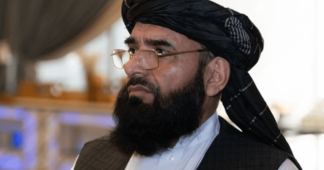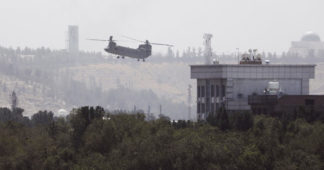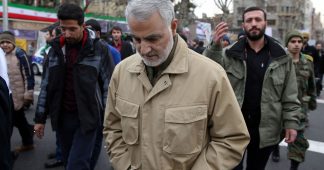By Seyed Mohammad Marandi
19 Aug 2021
Roughly 20 years ago, after the Taliban’s crushing defeat in Afghanistan and the complete withdrawal of support from Pakistan and Saudi Arabia under US pressure, the Quds Force began a dialogue with this seemingly diminished organization. At that time, many thought this to be a meaningless endeavor as the political landscape across the region was changing dramatically. The fact that the Taliban murdered 11 Iranian diplomats and a journalist inside the Iranian consulate in Mazar-i-Sharif, would have made this new direction seem grossly inappropriate in the eyes of many in Tehran, if publicized.
The US invasion of Afghanistan, and subsequently Iraq, forced the Americans to stomach the presence and role of powerful Iranian allies in both countries. The US-led occupation forces lacked a coherent long-term strategy as well as allies, while important opposition leaders and military and political organizations were based in Tehran. In Afghanistan, the US had to turn to a coalition of political parties or the so-called Northern Alliance, which was struggling under tremendous pressure in their resistance against a foreign-backed brutal and ruthless Taliban.
Therefore, when the Taliban was defeated and remnant forces fled the country, Iranian allies took key positions in the Afghanistan government. There seemed to be no need or justification for dialogue with this seemingly spent force. However, General Qasem Soleimani believed that the Taliban continued to have popular support among a significant segment of the Pashtun tribes and populations in southern Afghanistan and parts of Pakistan, and he felt that the only path to long-term regional stability was for all the parties to engage in dialogue.
General Soleimani also believed that under such circumstances, the only force that was prepared to significantly drive up the cost of the US-led occupation, a key strategic Iranian objective, was the Taliban. He knew that under such circumstances the occupation of both Iraq and Afghanistan would gradually become extremely problematic and unpopular in western countries and that ultimately, such a huge burden would hit western economies hard and force them to withdraw their forces from both countries.
The objective of the Quds Force was to create mutual understanding and to encourage the more moderate factions within the fragmented Taliban to gain the upper hand. General Soleimani believed it was inevitable that foreign forces would at some point be forced to leave the country, and that following the country’s liberation, it was essential that Afghanistan isn’t pushed by the withdrawing occupation forces into another devastating civil war.
2011 was a significant turning point in the relationship, and high-ranking delegations began visiting Tehran. As time went by, the relationships became warmer and even personal, so much so that when General Soleimani, Abu Mahdi al-Muhandes and their companions were murdered at Baghdad International Airport by the Trump regime, a high ranking Taliban delegation traveled to Tehran and visited his house to pay condolences to his family.
While accusations of Iranian military support for the Taliban against Afghan government forces are completely baseless, there was one significant and revealing instance where the Taliban asked for Iranian assistance. Both Iranian intelligence and the Taliban knew that US-linked factions within the rapidly collapsing ISIS were extracted from Syria and inserted into Afghanistan. The Taliban asked the Quds Force to help it defeat what it saw to be an existential threat. Iran informed the Afghan government, which wasn’t particularly happy with such cooperation, but they didn’t object.
Ultimately, the Taliban made 4 commitments to the Quds Force. It would maintain stability on the border with Iran, it would not compromise on its opposition to the presence of any foreign forces, it would not target other ethnic groups or sects, and that “brothers wouldn’t kill brothers.” While there are differing factions with very different views within the Taliban, the Iranian have assessed that during these years the current Taliban leadership has been committed to its promises.
This relationship has helped the Islamic Republic of Iran become an effective mediator in recent weeks and months, to ensure that the withdrawal of occupation forces doesn’t lead to civil war, and to prod the new government to be inclusive of all Afghans. Iran has strong reason to believe that the sudden withdrawal of western forces was designed to create instability and chaos in Afghanistan. The US believes that if it can’t have Afghanistan, then the country should become a source of persistent trouble for Iran, China, Russia and even India. Meanwhile, significant sums of money are currently being sent by Saudi Arabia and 2 other regional counties to support extremist takfirist factions within the Taliban. Iran isn’t naive, but doing what it can to prevent tragedy is a responsibility. If that doesn’t work, the Quds Force will vehemently support those resisting extremism and terrorism.
Iran is constantly working and negotiating with the different parties inside Afghanistan as well with neighboring countries, plus China and Russia, to block the efforts of those who are pushing for a return to the dark past. Iran’s imminent membership of the Shanghai Cooperation Organization will enhance its capability to coordinate international efforts in this regard.
General Soleimani is no longer among us, but his legacy continues to inflict blows on the dying US Empire.
Published at english.almayadeen.net











